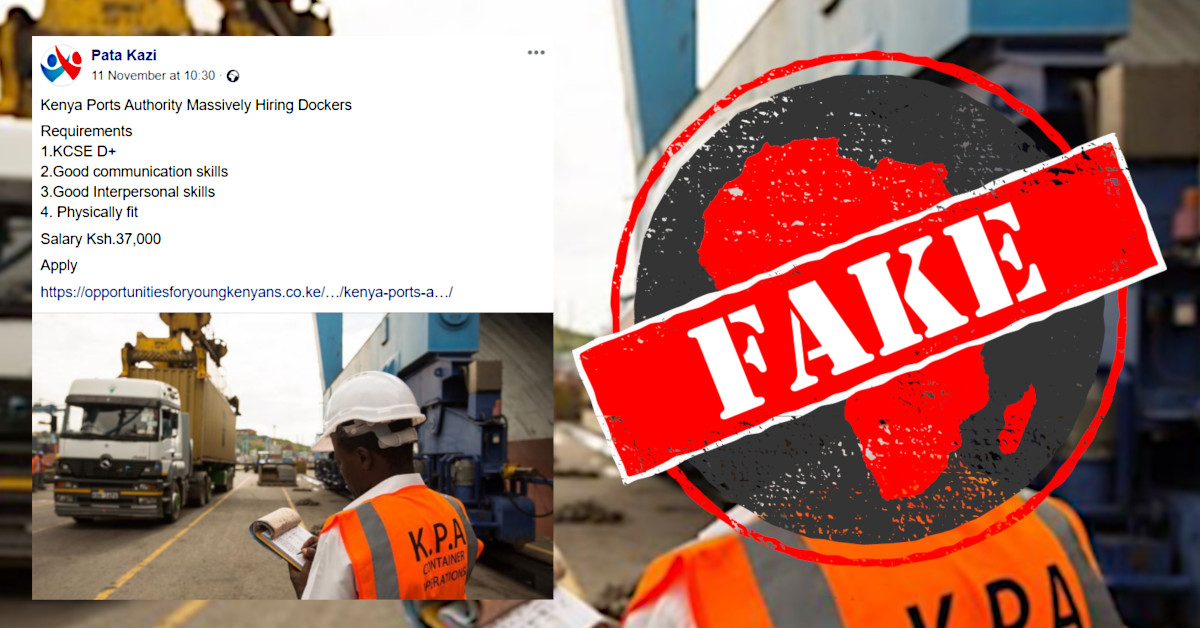“Kenya Ports Authority Massively Hiring Dockers,” claims a Facebook post shared on 11 November 2019.
It says the requirements are a D+ score in Kenya’s certificate of secondary education, “good communication skills”, “good interpersonal skills”, and that applicants must be “physically fit”. The post promises a salary of KSh37,000 (US$364).
It includes a link to an article on the site Opportunities for Young Kenyans. This shows two photos of a job ad headed “Career opportunity at Kenya Ports Authority”, with an application deadline of 15 November 2019.
Is this legit? We checked.

Africa Check took a look at the career section of KPA’s website and found no vacancies for November 2019.
We then asked Hajj Masemo, KPA’s information officer, about the post and the job ad.
“That is a fake document,” he told us.
On 12 November 2019, KPA posted a warning on Facebook and Twitter about another fake ad for jobs at the authority.
“It has come to the attention of the KPA Management that some fraudsters are inviting unsuspecting job seekers to submit applications at the Authority. For clarification call: 0720312211/0709092000. Email: [email protected] or [email protected],” the warning reads.
“We wish to clarify that KPA has a clear recruitment policy which includes publishing of vacancies in the mainstream newspapers and on the KPA website www.kpa.co.ke.”
It concludes: “Members of the public are therefore advised to ignore the messages circulating on social media and other online platforms purporting that KPA is currently undertaking massive recruitment for various positions. This is a hoax.” – Grace Gichuhi.
It says the requirements are a D+ score in Kenya’s certificate of secondary education, “good communication skills”, “good interpersonal skills”, and that applicants must be “physically fit”. The post promises a salary of KSh37,000 (US$364).
It includes a link to an article on the site Opportunities for Young Kenyans. This shows two photos of a job ad headed “Career opportunity at Kenya Ports Authority”, with an application deadline of 15 November 2019.
Is this legit? We checked.

‘This is a hoax’
Africa Check took a look at the career section of KPA’s website and found no vacancies for November 2019.
We then asked Hajj Masemo, KPA’s information officer, about the post and the job ad.
“That is a fake document,” he told us.
On 12 November 2019, KPA posted a warning on Facebook and Twitter about another fake ad for jobs at the authority.
“It has come to the attention of the KPA Management that some fraudsters are inviting unsuspecting job seekers to submit applications at the Authority. For clarification call: 0720312211/0709092000. Email: [email protected] or [email protected],” the warning reads.
“We wish to clarify that KPA has a clear recruitment policy which includes publishing of vacancies in the mainstream newspapers and on the KPA website www.kpa.co.ke.”
It concludes: “Members of the public are therefore advised to ignore the messages circulating on social media and other online platforms purporting that KPA is currently undertaking massive recruitment for various positions. This is a hoax.” – Grace Gichuhi.
Republish our content for free
For publishers: what to do if your post is rated false
A fact-checker has rated your Facebook or Instagram post as “false”, “altered”, “partly false” or “missing context”. This could have serious consequences. What do you do?
Click on our guide for the steps you should follow.
Publishers guideAfrica Check teams up with Facebook
Africa Check is a partner in Meta's third-party fact-checking programme to help stop the spread of false information on social media.
The content we rate as “false” will be downgraded on Facebook and Instagram. This means fewer people will see it.
You can also help identify false information on Facebook. This guide explains how.


Add new comment